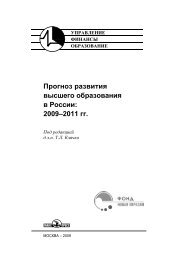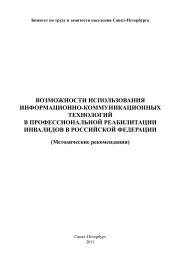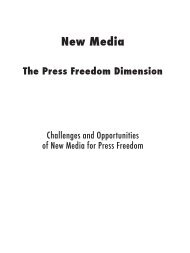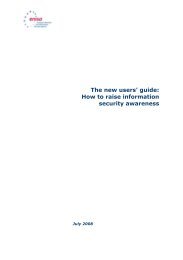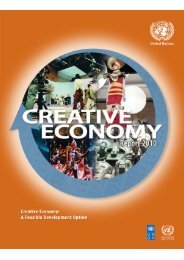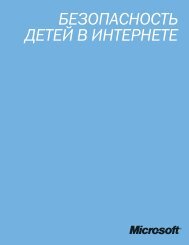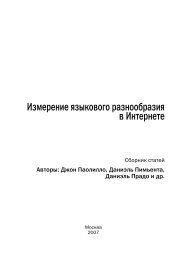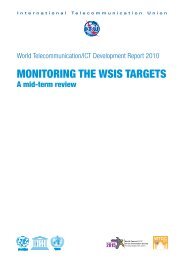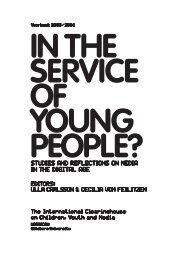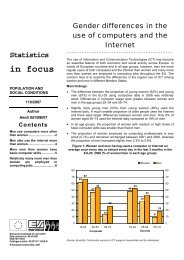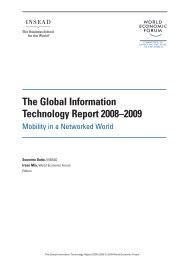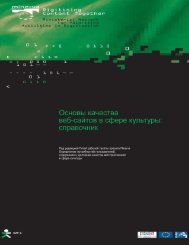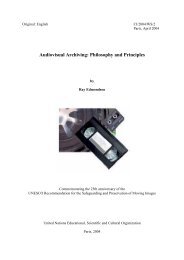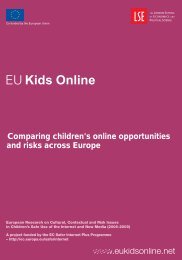Model curricula for journalism education for developing countries ...
Model curricula for journalism education for developing countries ...
Model curricula for journalism education for developing countries ...
Create successful ePaper yourself
Turn your PDF publications into a flip-book with our unique Google optimized e-Paper software.
105<br />
of last polls’ outcomes and their relation with following voting behavior. Explanation<br />
of the third special report (due in week 21): students will choose one political party<br />
campaign or a candidate campaign, and they will work in teams of three members<br />
each. They will prepare a 2500-word in-depth written report exploring a critical<br />
analysis of strategy, target, means and rhetorical techniques used in the campaign<br />
chosen. Reading <strong>for</strong> week 17: Lavrakas and Traugott (2000), Priess (2002) and García<br />
Beaudoux (2005)<br />
Week 17<br />
Lecture: Political communication. Fundamental notions of political communication:<br />
purposes, speakers, messages, audiences, channels. Permanent political<br />
communication: political strategies, public interest, news and official and non official<br />
in<strong>for</strong>mation. Specific communication. Political campaigns: strategies, messages,<br />
images, topics, financing. Seminar: discussion of some case studies based on local<br />
political campaign. Reading <strong>for</strong> week 18: Lavrakas and Traugott (2000), Priess (2002)<br />
and García B. (2005)<br />
Week 18<br />
Lecture: Political communication and rhetorical techniques: simplification, main<br />
enemy, exaggeration, counter-message, distortion. Political representation: politics<br />
as a show, debates, statements <strong>for</strong> television and radio, spots, political events,<br />
target audiences. Seminar: discussion of some case studies based on local political<br />
campaign. Reading <strong>for</strong> week 19: Lavrakas and Traugott (2000), Priess (2002) and<br />
García B. (2005)<br />
Week 19<br />
Lecture: Political communication and crisis: catastrophes, scandals, governmental<br />
or cabinet crises, conflicts, riots, wars. Techniques <strong>for</strong> gathering in<strong>for</strong>mation in a<br />
hostile environment. Seminar: analysis of some relevant media stories about crisis.<br />
A guest journalist with expertise in the field is suggested. Assignment: written report<br />
about media coverage of one local crisis, including interviews with journalists and<br />
witnesses involved. Reading <strong>for</strong> week 20: Jenkins and Thorburn (2003), Lavrakas and<br />
Traugott (2000), and Perloff (1998).<br />
Week 20<br />
Lecture: Citizen <strong>journalism</strong>. Journalism as a social activity. New roles <strong>for</strong> <strong>journalism</strong><br />
and public opinion. Building citizenship through participation, on line <strong>for</strong>ms of<br />
interactions (web, e-mail, <strong>for</strong>um, chat, blog), changing the community through the<br />
action of the media, helping critical public opinion. Assignment: written report about<br />
the work done by an institution involved in citizen <strong>journalism</strong>.



